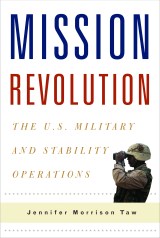An Afghan farmer's field planted with 82nd Airborne paratroopers in Ghanzi province, in June.
Having escaped Iraq after eight years, now mired in the nation’s 12th year in Afghanistan, Americans are probably ready for a book looking at the kind of missions the U.S. military has taken on post-9/11. They’re not pure combat, declare victory and come home – like 1991’s Gulf War – but neither are they an armed version of the Peace Corps. They straddle that messy divide where body counts mean little and winning hearts and minds can prove elusive.
 Jennifer Morrison Taw is assistant professor at California’s Claremont McKenna College, teaching international relations, security studies, and U.S. foreign policy. She spent a decade at the Rand Corp., where she focused on counterinsurgency, counterterrorism, and peacekeeping. Given that background, she’s well-suited to assay what one reviewer calls the ‘securitization of instability’ in Mission Revolution: The U.S. Military and Stability Operations. Battleland conducted an email chat with Taw earlier this week.
Jennifer Morrison Taw is assistant professor at California’s Claremont McKenna College, teaching international relations, security studies, and U.S. foreign policy. She spent a decade at the Rand Corp., where she focused on counterinsurgency, counterterrorism, and peacekeeping. Given that background, she’s well-suited to assay what one reviewer calls the ‘securitization of instability’ in Mission Revolution: The U.S. Military and Stability Operations. Battleland conducted an email chat with Taw earlier this week.
Why did you write Mission Revolution: The U.S. Military and Stability Operations?
I had been working on issues related to operations other than war and stability operations for a long time. When Department of Defense Directive 3000.05 elevated stability operations to a primary mission it struck me as deeply significant.
How much of a change did the Pentagon go through in 2005 when it embraced operations-other-than-war?
I know others disagree, but I think the changes in doctrine, training, education, and procurement indicate that it went through a pretty big change, a real, substantive change that reflected the reversal in the military’s attitude about its mission.
Is this the right role for the U.S. military? Why or why not?
I understand the appeal of using the military, given all of its inherent advantages. I think, though, that crossing that final line into traditionally-civilian roles is bad for the military, bad for civilian agencies, and ultimately bad for policymakers as it changes their foreign policy toolbox.
When it comes to stability ops, does the U.S. have the right balance between civilian and military efforts?
Oh, I don’t think so.
But then I think stability operations themselves reflect an overly ambitious approach to foreign policy. Civilians do not have the resources, manpower, or, frankly, charge, to do stability operations; the military now does, but that reflects a shift from the armed forces’ traditional purview onto a slippery slope where everything becomes a military responsibility.
What are the key lessons for the country stemming from our lengthy presences in Afghanistan and Iraq?
Toppling governments is a hazardous business.
For the U.S. to make its own foreign policy success contingent on building another country from the ground up is, at best, problematic. The costs to our armed forces, our economy, and our image abroad have been very high for a questionable payoff.
I think very few people would argue that either Iraq or Afghanistan is in a good place right now.
Are stability ops the same as nation-building? If not, spell out their differences.
The term stability operations is used in many ways. Some people do use it to refer to nation-building, but it is really a category of operations undertaken to promote stability, including security and economic and political growth.
Such operations are employed across the spectrum of conflict, during peacetime as well as during and in the aftermath of war, to help shape the environment to promote peace.
Nation-building as a term very specifically refers to developing a country’s economy, political institutions, and security forces; stability operations will be a part of this.

Columbia University Press
Is it right to think the U.S. under-estimates the costs – of all kinds – associated with such missions. If that’s true, why?
There are plenty of people who understand the costs of such missions; whether their voices are the ones being heard by policymakers will depend on a range of circumstances.
Does the American character — isolationism and other strains — work against these kinds of efforts?
Polls today are, unsurprisingly, showing that Americans are averse to foreign adventures, but that fluctuates.
Under the right conditions, Americans can be sold on deployments for stability operations in the name of the responsibility to protect, humanitarian crises, disaster relief, and even promoting stability.
Whether the American public will have the stomach for long, drawn-out operations, though, is a separate question. Some stability operations — disaster relief, friendship tours, etc. — are relatively low-cost and have defined end states. Those are not controversial.
Where the controversy arises is when troops are deployed to conduct operations for which the political objectives are murky, the desired end states are unclear, the measures of effectiveness are undetermined, and the costs are high.
That doesn’t mean we won’t get into those, though; it just means that there will be pressure to get out before the job is done, assuming it could ever be.


